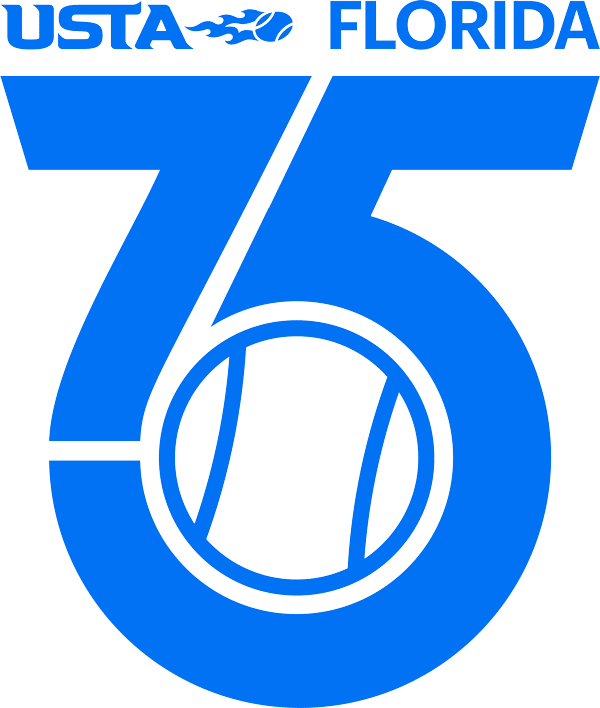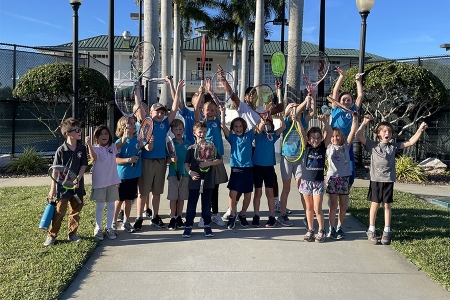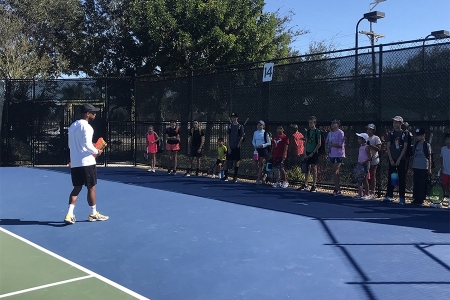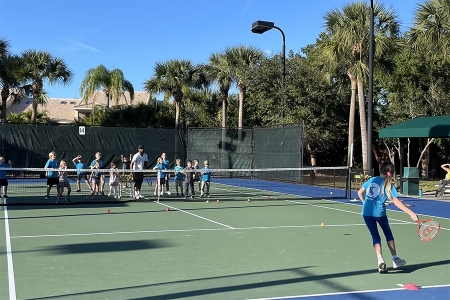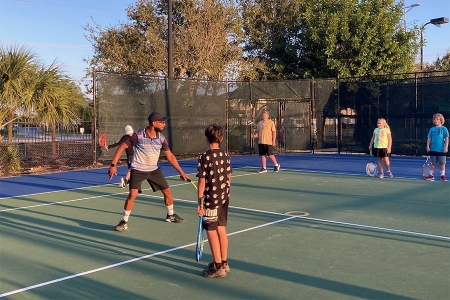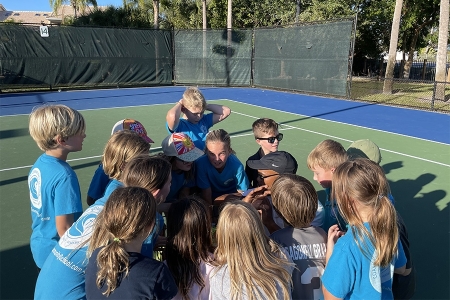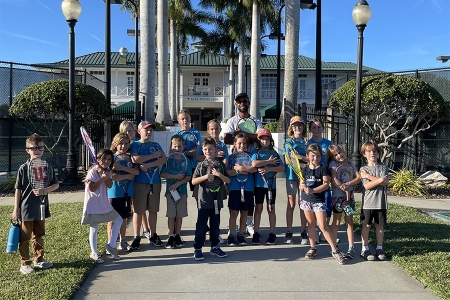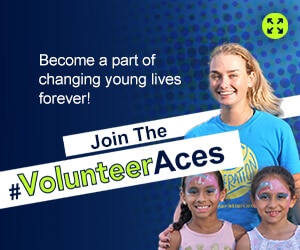In celebration of Black History Month, throughout February USTA Florida recognizes all of those in the Black community whose talents and dedication help to grow the great game of tennis every day — at every level. We applaud them all for making tennis a better and more inclusive sport, and for making the face of our game more accurately reflect the dynamic diversity of our country. As part of our coverage, USTA Florida has provided a platform for community members to be honest and open about their thoughts and experiences.
A jack-of-all-trades when it comes to coaching, 34-year-old Artie Yentumi has been teaching tennis in Brevard County for more than ten years. Yentumi currently works as a Tennis Professional at Kiwi Tennis Club in Indian Harbour Beach, where his typical day-to-day is busy with tennis. From prepping the ladies league teams during weekday morning clinics to providing private lessons and coaching the Mini Ace’s junior program, Yentumi’s diligence and dedication to the sport can be felt throughout the courts. Yentumi grew up in the suburbs of St. Louis, Mo., and currently resides in Melbourne.
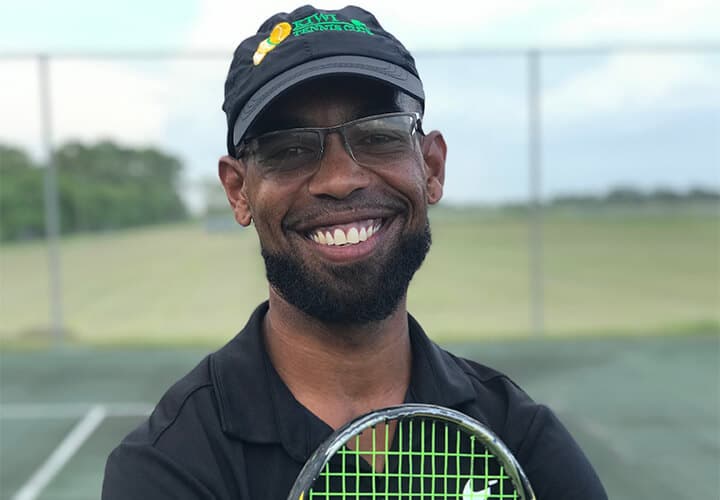
Artie Yentumi
When did you first pick up a racquet and how did you get your start in the sport?
My dad put a racquet in my hands after being enthralled in soccer life. The intense physicality of soccer prepared me for the court. Luckily, I had two great high school coaches, Mark Tabscott and Mark Platt, both of who mentored me and refined my wild game. They also exposed me to the parts of tennis I would not have had access to if it were not for their generosity. The extra time on the court, car rides as well as access to equipment and other tennis opportunities gave me admission to the industry.
What are some of the highlights that stand out in your tennis career?
My doubles partner, Trey Owens, and I won a few American Tennis Association (ATA) doubles tournaments in Indianapolis growing up, and those tournaments were like no other! The people, the RCA stadium, the top floor indoor pool, the dance parties after the tournament. To be immersed in black culture, on the tennis scene, while being in the city is very hard to describe. After being exposed to that elite tournament life in a comfortable setting I learned how to tune out in different environments so I would be able to focus on the stuff that matters, playing my best. I also loved playing D2 college tennis at Florida Institute of Technology under Bill Macom and traveling to Florida college tennis facilities. It was influential in making me want to stay in the sunshine state.
You’re a tennis pro at Kiwi Tennis Club, when did you start there and what do you do?
I started at Kiwi towards the end of the 2021 summer camp season, allowing me to feel out the club’s needs. I teach lessons and host clinics with league teams and juniors. Any extra club needs, such as events or pro exhibitions, I also like to participate in. Weekends consist of developing the junior tournaments and other tennis community activities. I want to help grow tennis as much as possible here on the space coast.
What is the most rewarding part of your job?
I love the engagement with the people – physically and mentally working out and improving ourselves! I also get to see instant results with most clientele with a quick grip change or technique tweak, encouraging me to keep at it. The positivity that tennis generates is motivating for me!
What is your history working in the sport before starting in your current position?
I have been teaching tennis throughout Brevard County since 2011 when I graduated from the Florida Institute of Technology. I started off by establishing myself at the Aquarina Country Club in Melbourne. Previous to my Florida teaching experience, most college summers I would go back to St. Louis and teach all around town for Mark Platt at the Beginners World Tennis, LLC., which allowed me to develop my style. Mark Platt is the one who MADE me go get certified in 2006 while I was in high school on his tennis team. The best argument I ever lost! I would also supplement with the Washington University Tennis Summer Camp under the guide of men’s head coach Roger Folmer. The exposure that I got from each opportunity was priceless, as each of my mentors went above and beyond to give me access beyond my means.
Before starting at Kiwi in 2021, I was Director of Tennis at the Palmer Inn and Tennis Club in Rockledge for four years. They had six clay courts but sold the property and the tennis play was shut down. Before closing, we grew the membership from 64 to 208 members participating in club activities, lessons, clinics, tournaments and playing in USTA and local leagues. I moved the teams and most members throughout Brevard County to other clubs and facilities that worked the best for each individual, creating the opportunity to work with Kiwi and the Parks and Recs department in the city of Melbourne.
Have you ever felt less valued in a tennis-related space because of your racial background?
I recognize the barriers that exist around me, not only in the sport of tennis, but in this country of the United States and the world. Tennis is a luxury sport that grants access to few. Trying to navigate the day-to-day while staying true to one’s self is the most important part. At times I dealt with things that were not a part of my ideals just to exist beyond the barriers. I also learned when to move on, allowing myself to recognize my value and potential and not compromise myself. My goal has always been to be a leader and motivator in whatever role I play. I am very fortunate to get to do it using tennis throughout Brevard County.
Has your race ever impacted your career on and off the court?
I know that opportunities come to those who go out and create them. I was fortunate enough to participate in the Junior World Team Tennis event at the Billy Jean King center in San Diego, CA. That experience changed my life, from the melting pot of junior players to the fun experiences shared during the trip. We were invited because we represented our area. That special invitation broke the barrier that I would have never been able to do by myself, exposing me to more of what I didn’t even know I wanted. Seeing the facilities, watching the training regiments, and understanding the daily routines and how much commitment it takes to be consistent. The commitment that was not always financially available or locked behind other barriers.
I have done my part to create opportunities; I’ve become specialized in what I do and with the services that I provide. I’ve certified that I provide a quality service throughout the community. I am excited to grow under the tutelage of others. Unlike some of my contemporaries, I have had to organically infiltrate the tennis industry, and I have not had many helping hands outside of the network that I grew up in. I hope to get more exposure and build from there.
What do you believe can be done to foster long-term change when it comes to racial inequality in Florida tennis?
With recent health developments, many new junior players are getting exposed to tennis because of safe play with social distancing. Finding more opportunities for juniors to have drop-in clinics, incentives for free tennis jamborees, and informal match play will boost junior player growth. In addition, more youth programs that travel to the school gym classes and take over for a period/day/week. This formula worked for my mentors and continues to be a great way to expose new juniors and establish a new program. It takes a skilled set of individuals to make tennis EXCITING, SAFE, and FUN which is why this doesn’t happen more often, especially to cultures that may not be as accepting or haven’t been exposed to tennis before.
More specifically, what do you think USTA Florida could do to strengthen its relationship with minority communities?
I believe the additional access as described above is needed, along with improved coach training specifically for customer relations and service. I also think adding more official junior tennis programs, such as NJTL chapters associated with public courts, will help strengthen the relationship. In my community, they offered a free, weekly tennis clinic after school. There are a lot of public courts that have football, baseball, and soccer fields all at the same location with a varied demographic. Being able to offer a free night of tennis with equipment to borrow to those who may not or cannot overcome the barriers to enter the sport, would be meaningful. Connecting with skilled individuals from the local tennis communities who can bridge gaps while keeping juniors engaged and educated about the sport is also needed.
Why is it important to celebrate Black History Month in general, as well as in tennis?
We have a mission to research, promote, preserve and disseminate information about the contributions of African-Americans in history and their diaspora. My mother teaches Spanish at Harris-Stowe State University, an HBCU in St. Louis. She easily connects with her students because of her ability to bring together the cultures and the factual information without belittling anyone, exposing them to their own cultural history.
Why is it important to not only support and celebrate other cultures but be inclusive to all?
We live in an ever-evolving society and tennis is an international sport. Understanding the cultural nuances is a necessity to be a successful international tennis player/coach. As the world becomes more unified with technology it is imperative that we all learn to work with each other. Taking time to appreciate other cultures is a critical component for the foundation for understanding.
If you had to share your message of unity, what would it be?
I aim to improve by positively influencing my community through motivation and helping others improve themselves, both physically and mentally. Let’s all be the positive change you want to see.
USTA Florida believes tennis is for everyone. For more information about USTA Florida’s Amplify initiative, visit USTAFlorida.com/Amplify.
